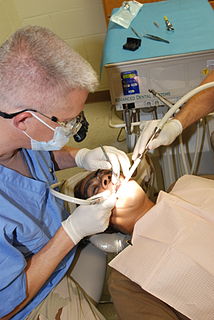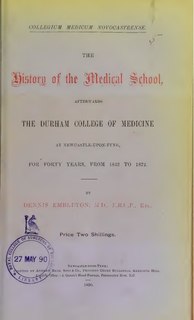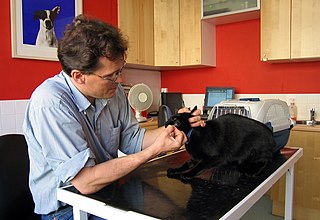Related Research Articles

Dentistry, also known as dental medicine and oral medicine, is a branch of medicine that consists of the study, diagnosis, prevention, and treatment of diseases, disorders, and conditions of the oral cavity, commonly in the dentition as well as the oral mucosa, and of adjacent and related structures and tissues, particularly in associated maxillofacial area. The field of dentistry or dental medicine includes teeth as well as other aspects of the craniofacial complex including the temporomandibular joint and other supporting, muscular, lymphatic, nervous, vascular, and anatomical structures. The practitioner is called a dentist.
Postgraduate education involves learning and studying for academic or professional degrees, academic or professional certificates, academic or professional diplomas, or other qualifications for which a first or bachelor's degree generally is required, and it is normally considered to be part of higher education. In North America, this level is typically referred to as graduate school.
A bachelor's degree or baccalaureate is an undergraduate academic degree awarded by colleges and universities upon completion of a course of study lasting three to six years. The two most common bachelor's degrees are the Bachelor of Arts (BA) and the Bachelor of Science. In some institutions and educational systems, certain bachelor's degrees can only be taken as graduate or postgraduate educations after a first degree has been completed, although more commonly the successful completion of a bachelor's degree is a prerequisite for further courses such as a master's or a doctorate.

Keele University, officially known as the University of Keele, is a public research university in Keele, approximately three miles (4.8 km) from Newcastle-under-Lyme, Staffordshire, England. Keele was granted university status by Royal Charter in 1962 and was founded in 1949 as the University College of North Staffordshire.

Nottingham Trent University (NTU) is a research university in Nottingham, England. Its roots go back to 1843 with the establishment of the Nottingham Government School of Design, which still exists within the university today. It is the 9th largest university in the UK with 35,785 students split over five different campuses.

Barts and The London School of Medicine and Dentistry, commonly known as Barts, is a medical and dental school in London, England. The school is part of Queen Mary University of London, a constituent college of the federal University of London, and a member of the United Hospitals. It was formed in 1995 by the merger of the London Hospital Medical College and St Bartholomew's Hospital Medical College.

The Royal Veterinary College is a veterinary school located in London and a member institution of the federal University of London. The RVC was founded in 1791 and joined the University of London in 1949. It is the oldest and largest Veterinary school in the United Kingdom, and one of only nine in the country where students can study to become a vet.

The University of Worcester is a public research university, based in Worcester, England. Worcester is the only university based in the counties of Worcestershire and Herefordshire. With a history dating back to 1946, the university began awarding degrees in 1997 and was granted full university status in 2005.

Newcastle University Medical School is the medical school at Newcastle University in England. It was established in 1834 in the city of Newcastle upon Tyne and served as the College of Medicine in connection with Durham University from 1851 to 1937 when it joined Armstrong College, to form King's College, Durham. In 1963 King's College became the University of Newcastle upon Tyne. The university now uses the name "Newcastle University".
The Master of Public Health or Master of Philosophy in Public Health (M.P.H.), Master of Science in Public Health (MSPH), Master of Medical Science in Public Health (MMSPH) and the Doctor of Public Health (Dr.P.H.), International Masters for Health Leadership (IMHL) are interdisciplinary professional degrees awarded for studies in areas related to public health. The MPH degree focuses on public health practice, as opposed to research or teaching. Master of Public Health programs are available throughout the world in Schools of Public Health, Programs in Public Health, Medical Schools, and Schools of Public Affairs. MPH degrees, in addition to including a core curriculum, will usually also let students pursue a specialization in a specific field, such as epidemiology, ophthalmology, biostatistics, or health management.

The School of Medicine is the medical school of the University of Leeds, in the city of Leeds, West Yorkshire, England. The School of Medicine was founded in 1831.
Aberdeen University School of Medicine, Medical Sciences & Nutrition contains the Medical School and Dental School at the University of Aberdeen in Scotland. It also provides training and carries out research in medical sciences, nutrition, public health, dentistry, health sciences, physician associate studies at BSc, MSc, and PhD levels. The current school was formed from the merger of the former School of Medicine & Dentistry, School of Medical Sciences, and the Rowett Institute of Nutrition.
Peninsula College of Medicine and Dentistry (PCMD) now known as Peninsula Dental School and Peninsula Medical School was a Medical and Dental school in England, run in partnership with the University of Exeter, the University of Plymouth and the NHS in Devon and Cornwall. In January 2013 the school began disaggregation to form Plymouth University Peninsula Schools of Medicine and Dentistry and the University of Exeter Medical School. The school had campuses at the University of Plymouth, the University of Exeter, the John Bull Building, the Royal Devon and Exeter Hospital and the Royal Cornwall Hospital. Teaching of medical students also took place at North Devon District Hospital in Barnstaple, South Devon Healthcare Trust in Torbay and General Practices across the region plus a number of community orientated healthcare settings.

Dentistry throughout the world is practiced differently, and training in dentistry varies as well.

Postgraduate Institute of Medical Education and Research (PGIMER) is a public medical university in Chandigarh, India. It is an 'Institute of National Importance' (INI). It has educational, medical research, and training facilities for its students including all specialties, super specialties and sub specialties. It is the leading tertiary care hospital of the region and caters to patients from all over Punjab, J&K, Himachal Pradesh, Uttarakhand and Haryana. Apart from the clinical services, PGI also provides training in almost all disciplines of Medicine including post graduate and post doctoral degrees, diploma and fellowships. There are more than 50 such training courses in the institute. Since it is a post graduate institute, it does not have facilities for undergraduate MBBS courses. It is ranked 2nd among medical universities in India in 2021 by the National Institutional Ranking Framework.
The University of Edinburgh Medical School is the medical school of the University of Edinburgh in Scotland and the United Kingdom and part of the College of Medicine and Veterinary Medicine, the head of which is Moira Whyte, who has also been head of the school since 2016. It was established in 1726, during the Scottish Enlightenment, making it the oldest medical school in the United Kingdom and is one of the oldest medical schools in the English-speaking world.
The Faculty of Veterinary Science is a faculty of the University of Pretoria. Founded in 1920, it is the second oldest veterinary faculty in Africa. With the exception of the faculties in Khartoum, and Cairo, all the other African faculties were established after 1960. It is the only one of its kind in South Africa and is one of 33 veterinary faculties in Africa.
A Bachelor of Medical Sciences is an undergraduate academic degree involving study of a variety of disciplines related to human health leading to an in depth understanding of human biology and associated research skills such as study design, statistics and laboratory techniques. Such disciplines include biochemistry, cell biology, physiology, pharmacology or psychosocial aspects of health. It is an equivalent level qualification to the more commonly awarded Bachelor of Science (BSc). Graduates may enter a diverse range of roles including post-graduate study, higher education, the biotechnology industry, the pharmaceutical industry, consultancy roles, scientific communication, education or unrelated disciplines which make use of the broad range of transferable skills gained through this degree.
In the United States and Canada, there are twelve recognized dental specialties in which some dentists choose to train and practice, in addition to or instead of general dentistry. In the United Kingdom and Australia, there are thirteen.

Veterinary medicine in the United Kingdom is the performance of veterinary medicine by licensed professionals. It is strictly regulated by the statute law, notably the Veterinary Surgeons Act 1966. Veterinary medicine is led by veterinary physicians, termed 'veterinary surgeons', normally referred to as 'vets'.
References
- ↑ Guidance from the University of Hull on compassionate or medical intercalation Archived 2013-12-03 at the Wayback Machine
- ↑ Guidance from the University of Warwick on an intercalated year in industry Archived 2013-11-24 at the Wayback Machine
- ↑ "List of UK intercalated degrees for medical students". Archived from the original on 5 September 2017. Retrieved 24 January 2020.
- ↑ Andrews, Freda (21 May 2001). "Veterinary Science". The Guardian. Retrieved 22 March 2022.
- ↑ Graham, Robert; Banks, David; Fentem, Peter (15 December 2005). "David Greenfield: Medical researcher who transformed training and services in one of our poorest hospital regions". The Guardian. Retrieved 22 March 2022.